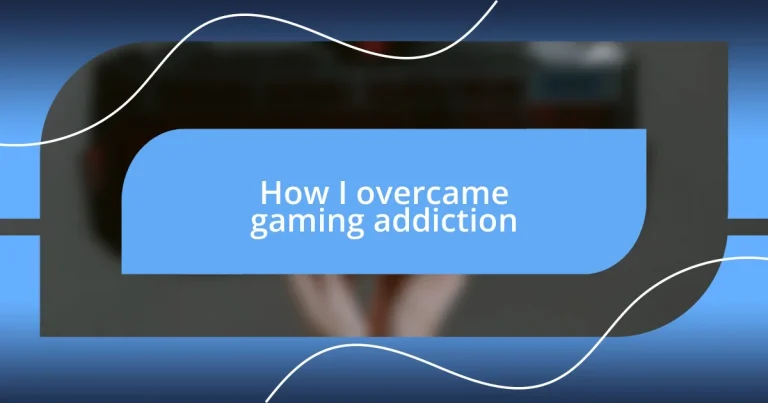Key takeaways:
- Recognizing personal triggers, such as stress and social isolation, is crucial for addressing gaming addiction and promoting self-awareness.
- Setting achievable goals and establishing a structured routine can help gradually reduce gaming time and foster a healthier lifestyle.
- Seeking support from friends, family, and professionals, along with celebrating small victories, can empower individuals on their journey to overcome gaming addiction.
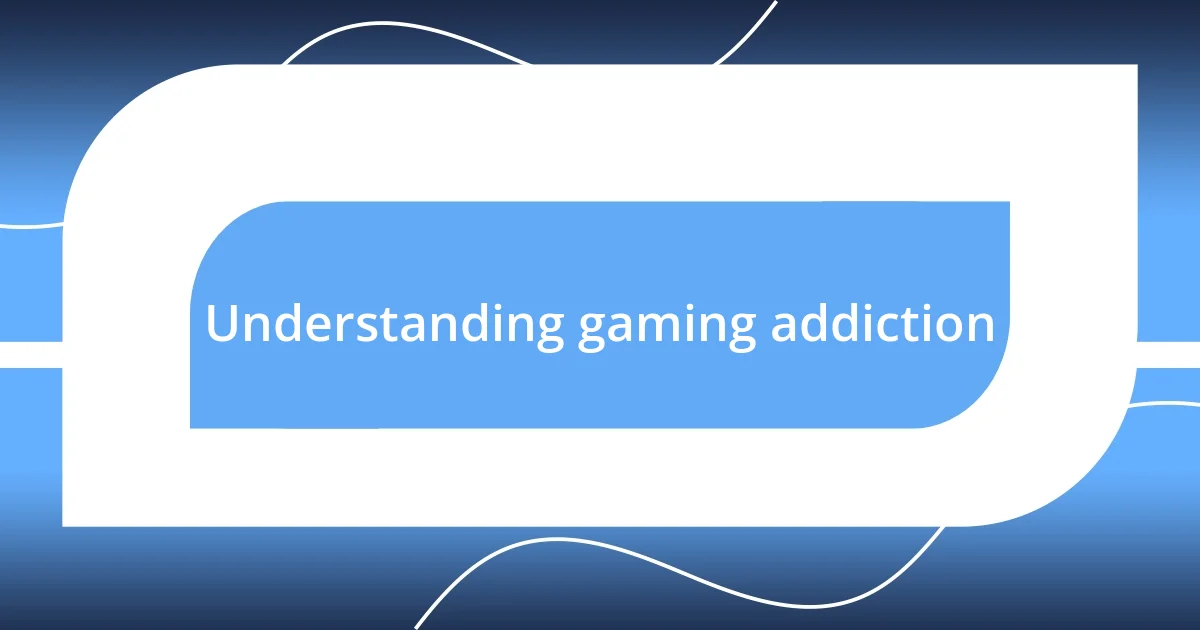
Understanding gaming addiction
Gaming addiction can feel like being trapped in a world where excitement often overshadows reality. I remember the days when I would lose track of time, my screen lit well into the early morning hours. Did you ever find yourself playing just one more level, only to realize hours have slipped away? It’s a slippery slope, and it can sneak up on anyone.
At its core, gaming addiction stems from the powerful dopamine rush provided by achievements within games. I’ve felt that thrilling high when I finally defeated a challenging boss or reached a new level, but it often left me feeling more empty afterward. As I indulged, I started to neglect other areas of my life—friends, family, even responsibilities—but it’s important to understand that these games are designed to be addictive, tapping into our desire for reward and accomplishment.
For many, including myself, gaming serves as an escape from stress or loneliness. In my experience, it’s all too easy to get drawn into a digital universe when life becomes overwhelming. But here’s a question to ponder: at what cost does that escape come? It’s vital to recognize when gaming crosses the line from a hobby into a dependency that can hinder personal growth and well-being.
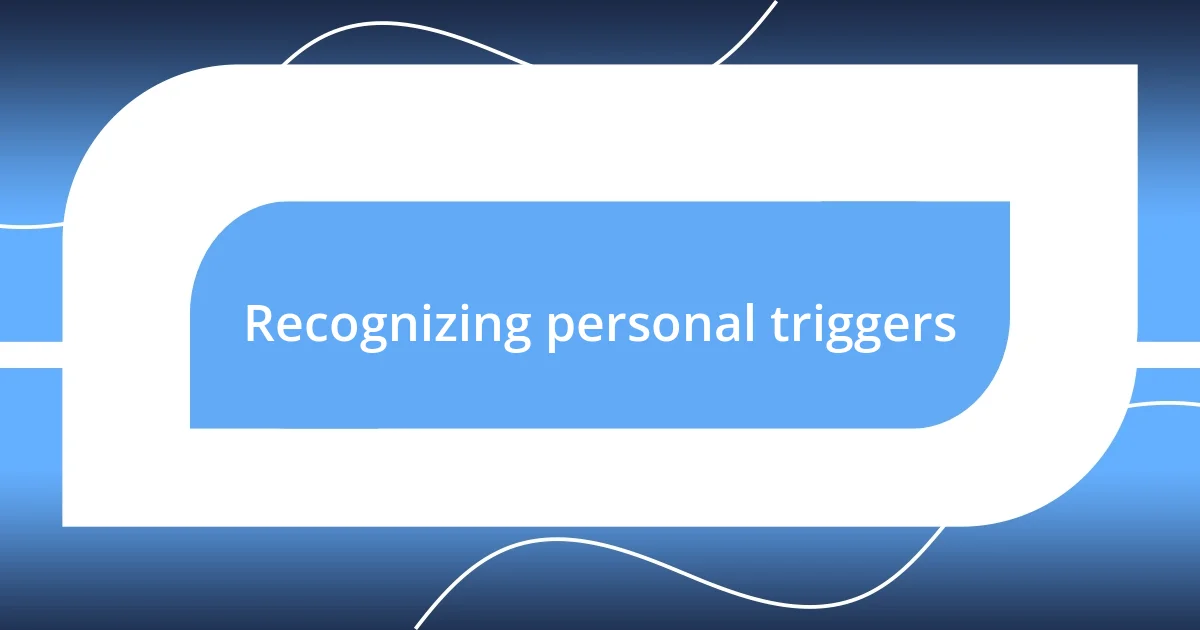
Recognizing personal triggers
Recognizing personal triggers is a crucial step in battling gaming addiction. For me, it often started with a stressful day at work; the moment I felt overwhelmed, I’d instinctively grab my controller. I’ve realized stress was a primary trigger that led me to seek refuge in gaming, masking my emotions instead of dealing with them. Have you ever used gaming as a way to escape from something pressing in your life? It’s a common path, and acknowledging it is the first step toward change.
Another trigger I discovered was social isolation. There were times when I felt alone or disconnected from friends, leading me straight to online gaming as a means of connection. While I thought I was socializing by playing with others virtually, I was actually distancing myself from real-life friendships. It’s that ironic twist that kept me stuck in a loop—seeking connection while simultaneously avoiding it. Have you felt that tug of wanting to connect yet retreating into your gaming chair? Recognizing this battle within myself was a turning point in understanding the cycle of my addiction.
In reflecting on these triggers, I learned the importance of self-awareness. Tracking my emotions and the situations that led me to game excessively became a practice I started. It was enlightening to document when I felt the pull towards games and correlating it with my emotional state. This process made me more accountable and provided insights that were previously hidden. How about you? Have you tried identifying what sparks your gaming sessions? This recognition empowers you to take control and seek healthier outlets.
| Trigger Type | Personal Experience |
|---|---|
| Stress | Turned to gaming after a demanding day at work as a way to cope. |
| Social Isolation | Felt alone and opted for online games instead of reaching out to friends. |
| Lack of Motivation | Found myself gaming when I had no interest in other activities. |
| Emotional Escape | Used gaming to distract from uncomfortable feelings or situations. |
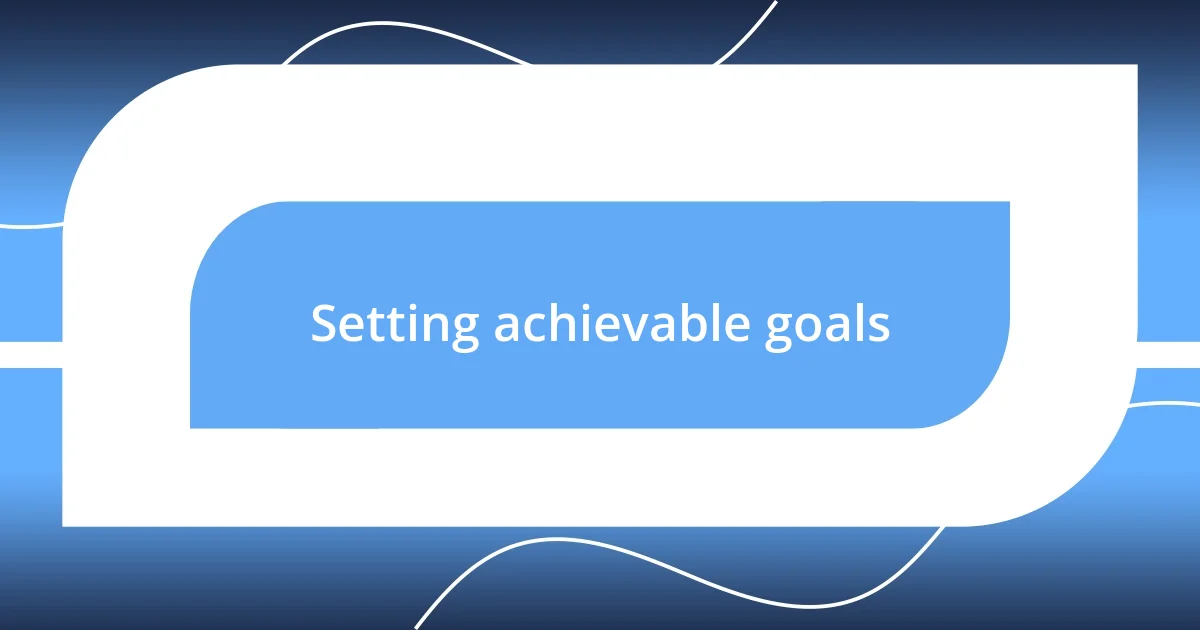
Setting achievable goals
Setting achievable goals is a game-changer in overcoming gaming addiction. I remember trying to cut down my gaming time drastically and feeling overwhelmed. Instead, I learned that starting small and setting realistic, measurable goals made the process not only manageable but also rewarding. For instance, I initially aimed to reduce my gaming to just one hour a day. This seemed much more attainable, and as I achieved this goal, I felt a sense of accomplishment that was far more fulfilling than any virtual victory could offer.
To help in this journey, here are some specific, realistic goals I found useful:
- Limit Playtime: Set a daily timer and stick to it, gradually shortening your gaming sessions.
- Schedule Breaks: Integrate short breaks in between gaming sessions to help reflect on your emotions and needs.
- Balance Activities: Create a daily or weekly schedule that includes other hobbies or responsibilities, ensuring gaming has its place without overtaking your life.
- Track Progress: Keep a journal to note your gaming hours and feelings each day, highlighting when you successfully stick to your goals.
It’s incredible how these small adjustments can lead to significant changes over time. Making these goals part of my routine slowly shifted my mindset, and I found myself engaging with life beyond the screen more and more. The gradual accomplishment of these small steps replaced my need for immediate gratification from gaming with a more lasting sense of fulfillment.
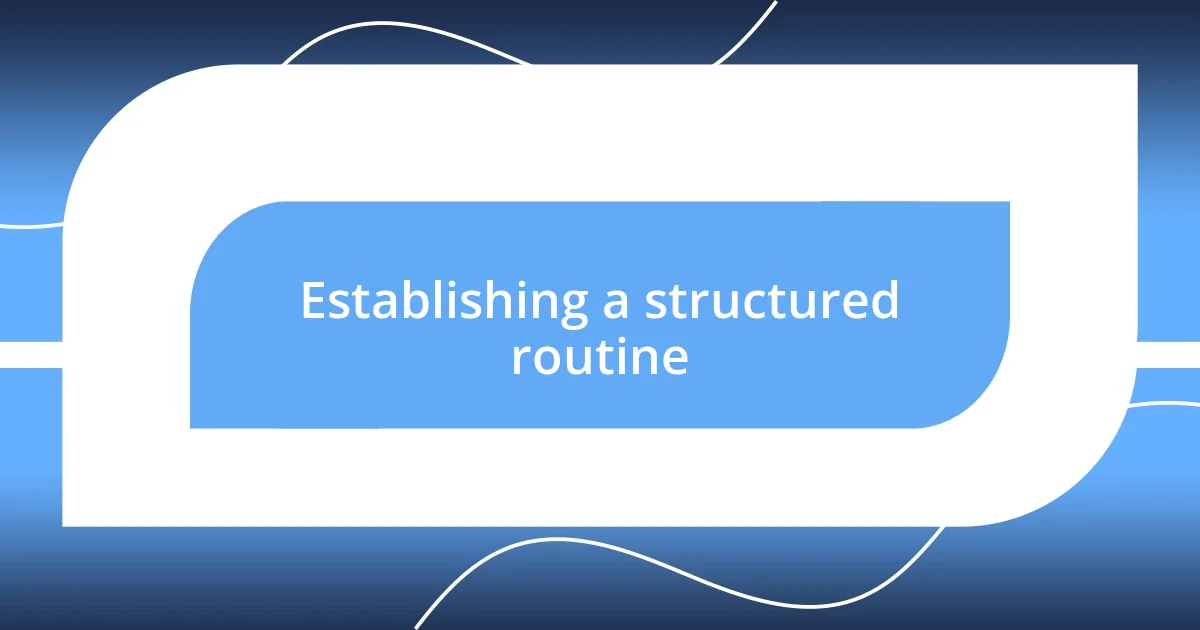
Establishing a structured routine
Establishing a structured routine was essential for my recovery journey. For a while, my days blended seamlessly into nights spent gaming, which felt more monotonous than exhilarating. When I started designating specific hours for different activities—work, exercise, and gaming—it brought a refreshing order to my life. Can you remember the last time you felt thoroughly organized? The discipline I developed became a motivational force that helped me break the cycle.
Every morning, I crafted a to-do list filled with both responsibilities and self-care activities. This simple act gave me a sense of purpose and direction each day, which was something I desperately needed. One technique I found effective was the “Pomodoro Technique,” where I focused deeply on a task for 25 minutes, followed by a short break. I remember feeling a huge boost in my productivity during these focused periods. Who knew that a little timer could be so transformative? Incorporating this structure helped replace excessive gaming time with engaging real-world activities, fostering a healthier lifestyle and mindset.
There were days when the urge to game still surged, but having a clear routine made it easier to choose a healthier alternative. I began replacing gaming sessions with walks in nature or reading books that had long been neglected on my shelf. In this way, I wasn’t just cutting back on gaming; I was enriching my life with diverse experiences. Isn’t it fascinating how an organized routine can open doors to a life filled with fulfillment rather than escapism? Each small victory within my structured approach built a momentum that felt empowering, steering me further away from my old habits and towards a more balanced existence.
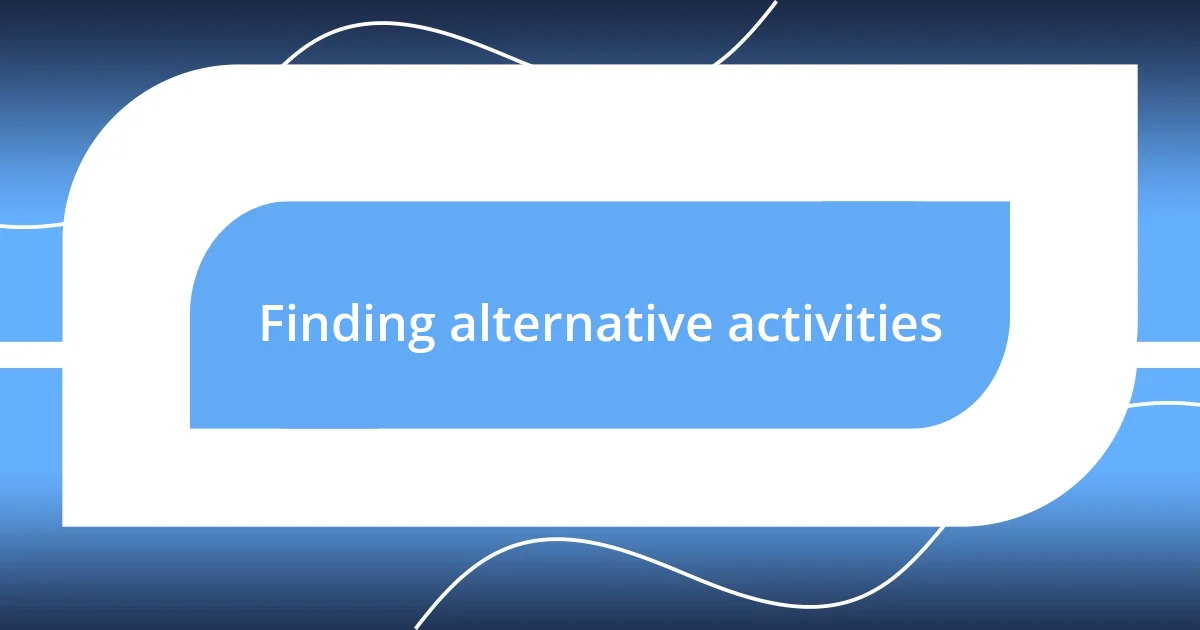
Finding alternative activities
Finding alternative activities was one of the most rewarding aspects of my journey. I remember the first day I picked up a guitar—a hobby I’d long buried under endless gaming hours. Strumming those strings felt completely foreign at first, but with each chord, I discovered a new world of creativity that ignited my passion in unexpected ways. Have you ever felt the thrill of learning something new? It’s that rush of excitement that reminds you there’s life beyond the screen.
As I started exploring different activities, I was amazed at the variety available—fitness classes, art projects, cooking new recipes. I vividly recall one weekend when I joined a local hiking group. It was exhilarating to connect with nature and other people while simultaneously working out. The sense of achievement I felt as I reached the summit of that trail? Unmatched. It’s incredible how these alternative pursuits not only filled my time but also introduced me to incredible friendships and experiences I never would have encountered if I’d stayed glued to my gaming chair.
I found that the more I indulged in these new endeavors, the less I craved gaming. How often do we get stuck in our comfort zones? Shifting my focus allowed me to break free from that cycle. Engaging in activities that fed my curiosity also gave me a sense of purpose. Whether it was crafting something with my hands or diving into books I had previously overlooked, I learned to appreciate the beauty in the process. This transformation reminded me to savor every moment—something gaming had temporarily dulled. What could be more fulfilling than discovering and growing in ways I never thought possible?
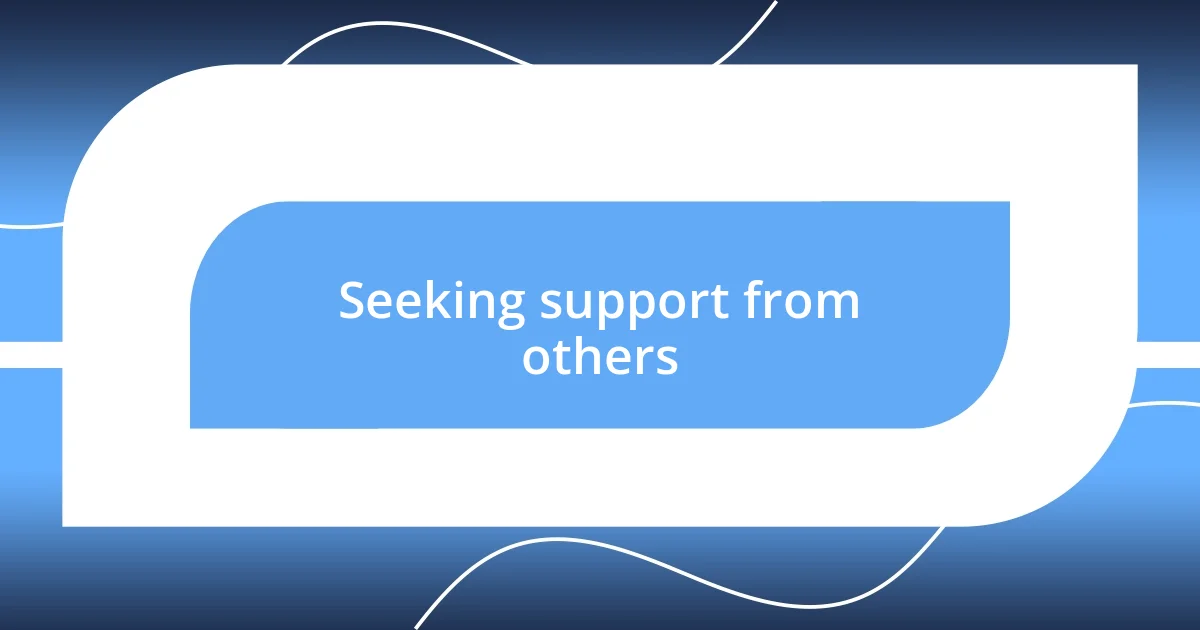
Seeking support from others
Reaching out for support from friends and family was a turning point in my journey. I recall feeling both vulnerable and relieved when I finally opened up about my gaming struggles. Have you ever shared a burden you thought no one would understand? Their empathy and encouragement reminded me that I wasn’t alone—that deep connection sparked a resolve in me to keep moving forward.
In addition to leaning on loved ones, I found incredible value in joining online forums and local groups focused on recovery. The sense of community in these spaces was palpable. I remember reading someone’s story about their own battles and victories, which made me feel like a part of something bigger. It was empowering to trade tips and share experiences with others who genuinely understood the struggle. There’s a comfort in shared experiences that makes the journey feel a little less daunting, wouldn’t you agree?
I also sought professional help, which provided me with strategies specifically tailored to my situation. Talking through my feelings with a therapist helped me identify the underlying issues behind my addiction and equipped me with tools to handle cravings. I can still vividly remember those “aha” moments when a simple insight transformed my perspective. The effort to seek help from varied sources showed me that it’s perfectly okay to ask for assistance; sometimes, strengthening my resolve came through the strength of others. Isn’t it amazing how connections can guide us through the darkest moments?
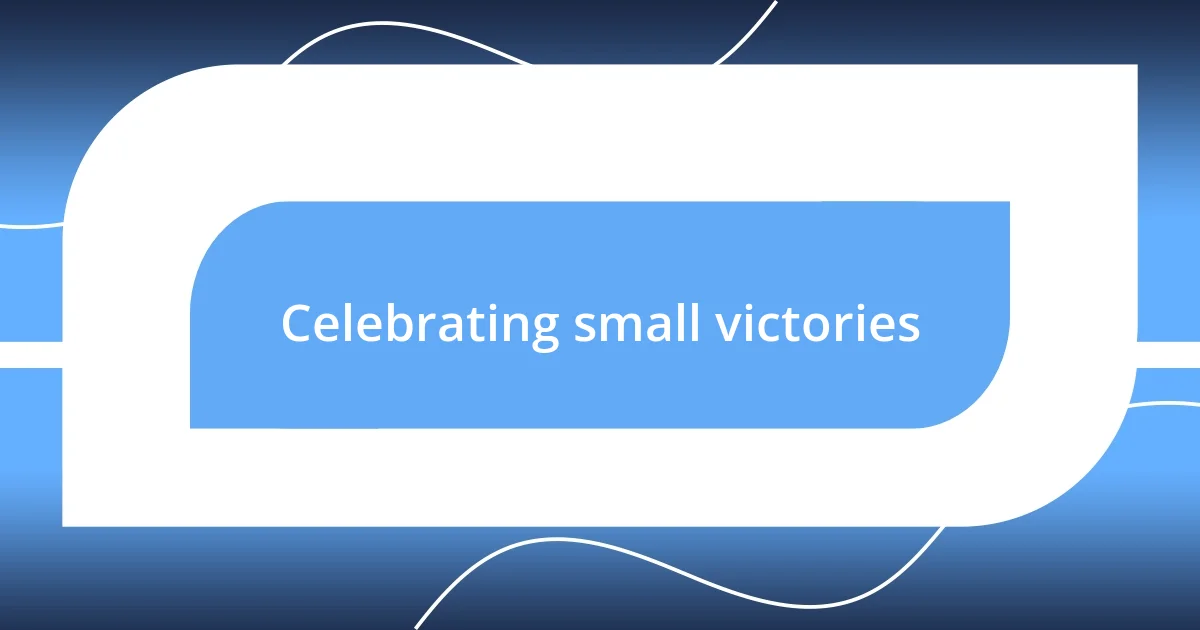
Celebrating small victories
Celebrating small victories was a game changer for me during my recovery. I’ll never forget the day I resisted the urge to play after a long week. Instead, I chose to take a long walk around my neighborhood. As I strolled past blooming flowers and chirping birds, I felt a sense of accomplishment flood through me. It made me realize that each small step away from gaming was a step towards a more fulfilling life. Have you ever paused to appreciate little moments that made you proud?
I started keeping a journal to document these small wins—whether it was successfully skipping a gaming session or focusing on a hobby for an hour. Looking back at those entries filled me with a sense of pride. It’s easy to overlook these milestones, but writing them down was like collecting trophies that acknowledged my progress. One particular entry still sticks with me: I had managed not to game for three days in a row, and I celebrated by treating myself to a nice dinner. It taught me the importance of recognizing achievements, no matter how minor they may seem. Why not take a moment to celebrate something positive in your life today?
Over time, these small victories began to build momentum that left me feeling more empowered. I remember feeling nervous about trying an art class, but I diligently showed up and completed my first painting. That one piece became a symbol of my growth. Each time I glanced at it, I was reminded of the bravery it took to step outside my comfort zone. It wasn’t just about the painting; it was about embracing new experiences with open arms. Isn’t it incredible how a series of tiny successes can create a path toward something greater?












